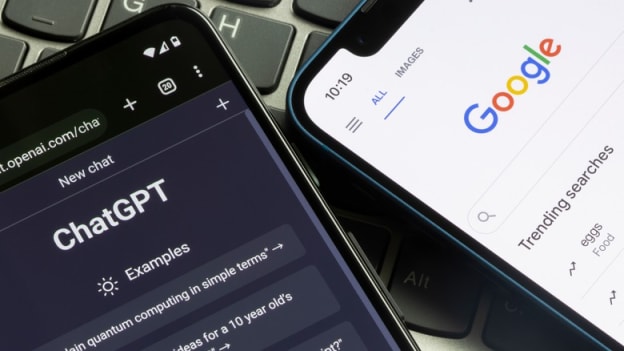AI Battle Heats Up: Google unveils 'Bard' to take on Microsoft's ChatGPT

Google has unleashed Bard to counter Microsoft’s ChatGpt in a sign of intense AI warfare.
Bard is the outcome of the search engine’s long quest to outsmart the rival techno giant’s ChatGPT launched in late 2022.
The latest sensation in the world of AI, ChatGPT, is taking the tech community by storm with its uncanny ability to produce text that mimics human writing. With AI poised to be the next big thing, tech giants are racing to be at the forefront of this cutting-edge technology. And, in this battle for AI supremacy, two tech heavyweights, Google and Microsoft, are in an intense rivalry.
Google’s latest AI accomplishment was made public by CEO Sundar Pichai, who said in a blog post that BARD will be opened up to ‘trusted testers,’ starting Monday, with plans to make it available to the public “in the coming weeks.”
“Soon, you’ll see AI-powered features in Search that distill complex information and multiple perspectives into easy-to-digest formats, so you can quickly understand the big picture and learn more from the web: whether that’s seeking out additional perspectives, like blogs from people who play both piano and guitar, or going deeper on a related topic, like steps to get started as a beginner,” Pichai wrote in Google blog.
And to be clear: Bard is separate from Google search. The above screenshot is highlighting the AI-powered features that will be rolling out on Google Search “soon.”
What is Bard?
Bard is an AI chatbot that will make Internet surfing easier for everyone. Just like ChatGPT, Google Bard will bring direct answers to the questions asked by users, but the Bard AI bot will probably be better than ChatGPT. Unlike ChatGPT which has data stored till 2021 only, Google Bard can search the internet in real-time to get the best and most accurate answers.
How will it work?
In a blog post, Google said Bard can help people perform tasks like planning a baby shower, comparing two Oscar-nominated movies, or explaining discoveries by NASA to a 9-year-old child.
Like ChatGPT, which was released publicly in late November by AI research company OpenAI, Bard is built on a large language model. These models are trained on vast troves of data online to generate compelling responses to user prompts.
The mechanism
According to Pichai, Bard is powered by LaMDA (Language Model for Dialogue Applications). As claimed by Google, Bard will offer fresh information and content to the users from the web and this is a hard hit to ChatGPT which hasn’t been able to do that yet.
As of now, Google has released a lightweight model version of LaMDA, which is a smaller model and requires less computing power. After gathering feedback from various external and internal testers, Google will then make necessary changes to their AI chatbot Bard and then, finally, we will be able to use it too. Google’s basic idea behind releasing a chatbot is to help people get more personalised answers to their questions, which isn’t possible yet with their search engine.
How to get access to Bard?
The Google Bard AI chatbot is not available to the public yet. Google has asked various professional testers to test their AI bot to make sure that it’s safe and efficient. Once these tests are done, Google will roll out a public version of Google Bard too. Hopefully, we will get to see Bard AI within a few weeks.
Pichai, however, didn't mention in his post whether Bard will be able to write prose in the vein of William Shakespeare, the playwright who inspired the service's name.
"Bard can be an outlet for creativity, and a launchpad for curiosity," Pichai wrote Google announced Bard's existence less than two weeks after Microsoft disclosed it's pouring billions of dollars into OpenAI, the San Francisco-based maker of ChatGPT and other tools that can write readable text and generate new images.
Microsoft's decision to up the ante on a USD 1 billion investment that it previously made in OpenAI in 2019 intensified the pressure on Google to demonstrate that it will be able to keep pace in a field of technology that many analysts believe will be as transformational as personal computers, the internet and smartphones have been in various stages over the past 40 years.
A team of Google engineers working on artificial intelligence technology "has been asked to prioritise working on a response to ChatGPT".
Bard had been a service being developed under a project called "Atlas," as part of Google's "code red" effort to counter the success of ChatGPT, which has attracted tens of millions of users since its general release late last year, while also raising concerns in schools about its ability to write entire essays for students.
Pichai has been emphasising the importance of artificial intelligence for the past six years.
Despite their growing popularity among both users and tech companies, AI tools like ChatGPT have sparked some concerns, including the potential for perpetuating biases and spreading misinformation.
















